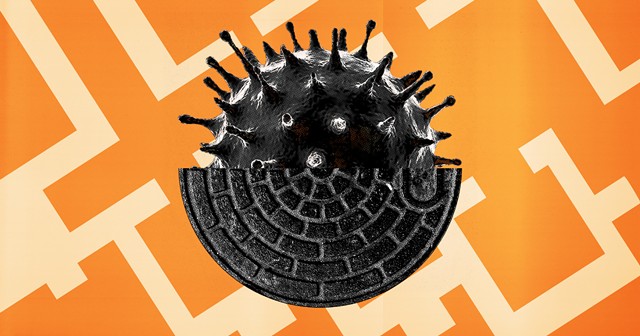[
{
"name": "500x250 Ad",
"insertPoint": "5",
"component": "15667920",
"parentWrapperClass": "",
"requiredCountToDisplay": "1"
}
]
An effort by the Rochester Institute of Technology to protect the thousands of its students returning to campus next month from the novel coronavirus is going down the toilet — in a good way.
The school plans to routinely test the wastewater coming out of its residence halls and student apartment buildings for signs of genetic material from SARS-CoV-2, the virus that causes COVID-19.
The sewage tests are among a variety of approaches that RIT is taking to try to detect the virus and prevent it from ripping through the campus. The strategy is spelled out on page 10 of RIT Ready, the school’s reopening plan.
“It’s one piece of the pie,” said Enid Cardinal, RIT’s Senior Advisor to the President for Strategic Planning and Sustainability. “It’s not the only thing, but we think it’s an important one.”
Testing wastewater for the virus will serve as a sort of early detection system for campus staff and students, Cardinal explained. People who are infected with the coronavirus shed it in their feces and they do so for several days before they show symptoms — if they show symptoms at all.
RIT will first establish a baseline for the campus, then when samples indicate that virus levels are rising staff can intervene with testing, contact tracing, education, and other tactics, such as limiting or prohibiting visitors, Cardinal added. If the samples show a surge of infections in an individual residential building, staff will be able to concentrate on those residents specifically.
“It’s more of an indicator to us that we can then use testing to identify any individuals that may be carrying the virus, and then we can move forward with isolation and quarantine rather than having to wait for them to show symptoms,” Cardinal said.
RIT isn’t the only local institution exploring wastewater testing as a way to monitor for surges in coronavirus infections. St. John Fisher College is also evaluating the approach, though a spokesperson said the college is early in the process and not in a position to comment.
Monroe County’s Department of Environmental Services has also taken a few samples from the county wastewater system, which combines sewage from residential and commercial sources with storm water. Steve Barz, a county spokesperson, said that the county hasn’t received enough data to conduct a meaningful analysis.
“It’s a steep learning curve and everyone is learning a lot,” said Katrina Korfmacher, director of the Community Engagement Core at University of Rochester’s Environmental Health Sciences Center.
Schools and wastewater system operators across the country are piloting programs to monitor sewage for COVID-19, as are researchers in several European countries. They all see the approach as a potential early warning system for a surge of coronavirus infections.
The idea of monitoring wastewater to catch infectious disease outbreaks as they begin is not new. The method has been used to track polio — also a pathogen carried in feces — and target vaccination efforts for 25 years, most recently in Pakistan, Nigeria, and Israel, said David Larsen, an associate professor of public health at Syracuse University. Israel had a polio outbreak in 2013 and 2014 that was identified not through any cases of disease, but through monitoring of wastewater. Polio remains endemic in Pakistan but it hasn’t been detected in Nigeria since 2016.
Syracuse University has been working with Onondaga County on wastewater monitoring since April and has developed an early warning wastewater surveillance platform that it’s trying to scale out statewide. It’s now in 12 counties, said Larsen, an environmental epidemiologist, has been studying wastewater monitoring of COVID-19 since March.
Wastewater surveillance is cost effective, especially when compared to monitoring infection trends through mass testing of individuals, Larsen said in a phone interview. The results also come back quicker allowing municipalities, public health authorities, institutions, and the public to act sooner should they need to, and with more precision.
Catching a rise in infections early could mean that officials may have some leeway to encourage the public to curb social contacts in hopes of avoiding a shutdown, Larsen added.
“The wastewater is actually a leading indicator, so it precedes what’s going to happen with cases,” Larsen explained. “So you get a better, more real-time measure of transmission than cases, and definitely than hospitalizations and deaths.”
Jeremy Moule is CITY's news editor. He can be reached at [email protected].
The school plans to routinely test the wastewater coming out of its residence halls and student apartment buildings for signs of genetic material from SARS-CoV-2, the virus that causes COVID-19.
The sewage tests are among a variety of approaches that RIT is taking to try to detect the virus and prevent it from ripping through the campus. The strategy is spelled out on page 10 of RIT Ready, the school’s reopening plan.
“It’s one piece of the pie,” said Enid Cardinal, RIT’s Senior Advisor to the President for Strategic Planning and Sustainability. “It’s not the only thing, but we think it’s an important one.”
Testing wastewater for the virus will serve as a sort of early detection system for campus staff and students, Cardinal explained. People who are infected with the coronavirus shed it in their feces and they do so for several days before they show symptoms — if they show symptoms at all.
RIT will first establish a baseline for the campus, then when samples indicate that virus levels are rising staff can intervene with testing, contact tracing, education, and other tactics, such as limiting or prohibiting visitors, Cardinal added. If the samples show a surge of infections in an individual residential building, staff will be able to concentrate on those residents specifically.
“It’s more of an indicator to us that we can then use testing to identify any individuals that may be carrying the virus, and then we can move forward with isolation and quarantine rather than having to wait for them to show symptoms,” Cardinal said.
RIT isn’t the only local institution exploring wastewater testing as a way to monitor for surges in coronavirus infections. St. John Fisher College is also evaluating the approach, though a spokesperson said the college is early in the process and not in a position to comment.
Monroe County’s Department of Environmental Services has also taken a few samples from the county wastewater system, which combines sewage from residential and commercial sources with storm water. Steve Barz, a county spokesperson, said that the county hasn’t received enough data to conduct a meaningful analysis.
“It’s a steep learning curve and everyone is learning a lot,” said Katrina Korfmacher, director of the Community Engagement Core at University of Rochester’s Environmental Health Sciences Center.
Schools and wastewater system operators across the country are piloting programs to monitor sewage for COVID-19, as are researchers in several European countries. They all see the approach as a potential early warning system for a surge of coronavirus infections.
The idea of monitoring wastewater to catch infectious disease outbreaks as they begin is not new. The method has been used to track polio — also a pathogen carried in feces — and target vaccination efforts for 25 years, most recently in Pakistan, Nigeria, and Israel, said David Larsen, an associate professor of public health at Syracuse University. Israel had a polio outbreak in 2013 and 2014 that was identified not through any cases of disease, but through monitoring of wastewater. Polio remains endemic in Pakistan but it hasn’t been detected in Nigeria since 2016.
Syracuse University has been working with Onondaga County on wastewater monitoring since April and has developed an early warning wastewater surveillance platform that it’s trying to scale out statewide. It’s now in 12 counties, said Larsen, an environmental epidemiologist, has been studying wastewater monitoring of COVID-19 since March.
Wastewater surveillance is cost effective, especially when compared to monitoring infection trends through mass testing of individuals, Larsen said in a phone interview. The results also come back quicker allowing municipalities, public health authorities, institutions, and the public to act sooner should they need to, and with more precision.
Catching a rise in infections early could mean that officials may have some leeway to encourage the public to curb social contacts in hopes of avoiding a shutdown, Larsen added.
“The wastewater is actually a leading indicator, so it precedes what’s going to happen with cases,” Larsen explained. “So you get a better, more real-time measure of transmission than cases, and definitely than hospitalizations and deaths.”
Jeremy Moule is CITY's news editor. He can be reached at [email protected].
Latest in News
More by Jeremy Moule
-

ROCHESTER TEN
ANNETTE RAMOSAug 1, 2023 - More »







